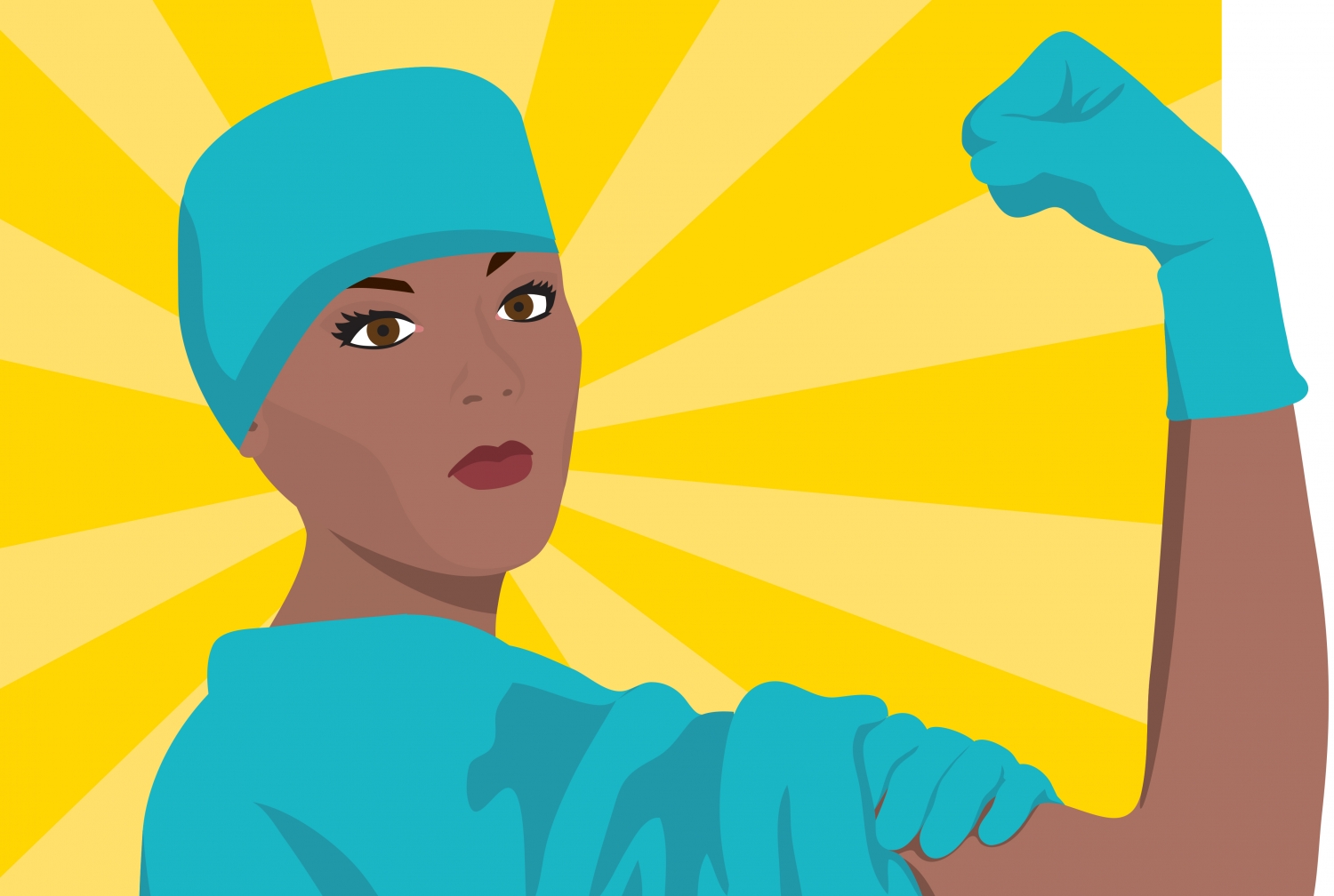By Heather Salerno
Editor's note: This story was reported prior to this summer's demonstrations in support of racial justice.
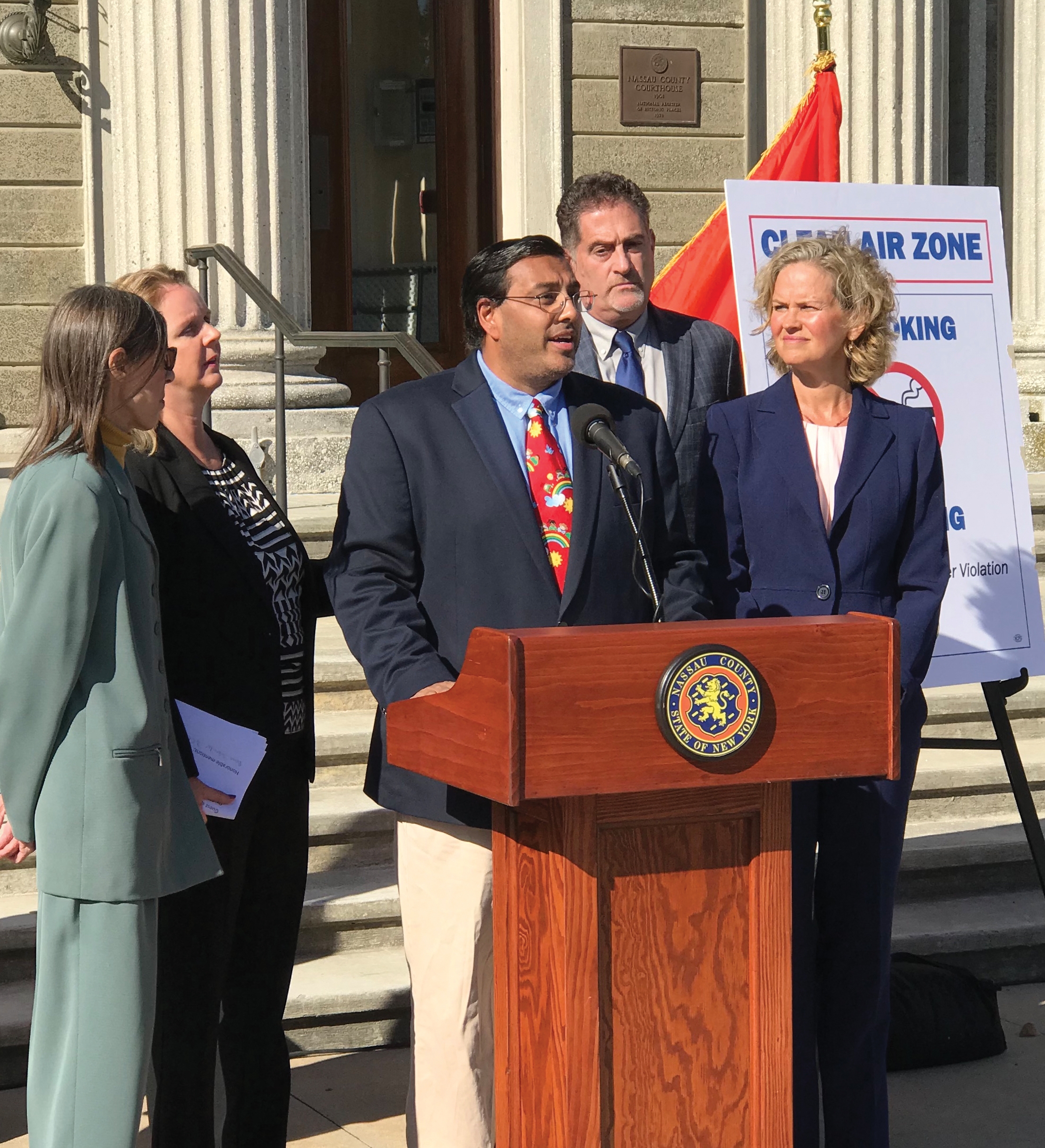
Pediatrician Dr. Shetal Shah, MD ’00, at a fall 2019 press conference where he advocated for a ban on vaping in public parks in New York’s Nassau County. Photo: Provided
In early March, Dr. Shetal Shah, MD ’00, was in Albany along with other doctors to lobby for important regulations to protect children’s health. As president of New York State Chapter 2 of the American Academy of Pediatrics, Dr. Shah had been there many times before, including last summer as the state grappled with the largest measles outbreak in decades. He’s among the physicians who helped convince lawmakers to eliminate nonmedical exemptions for immunizations for schoolchildren, despite fervent opposition from vaccine skeptics and advocates for religious freedom. As he left a legislator’s office on this particular day, a group of anti-vaccine protestors who heard Dr. Shah was at the Capitol began following him throughout the building and shouting at him, an encounter that was later posted on YouTube. “How does it feel to kill kids?” one man yelled. Being the target of such vitriol is troubling, but Dr. Shah doesn’t regret trying to push the bill through. He was horrified to see so many people —especially children — sickened by a preventable disease and was determined to do something about it. Members of his organization made more than 1,000 phone calls to state senators about the exemption, visited district offices statewide, and created hundreds of social media posts to combat disinformation. “I went to Albany seven times in the span of eight or nine weeks. Even now, thinking about it exhausts me,” says Dr. Shah, a neonatologist and researcher at Maria Fareri Children’s Hospital and New York Medical College in Valhalla, New York. “Normally physicians don’t meet with legislators, but there is a growing opposition that is trying to delegitimize physician expertise on vaccines and other aspects of health. We have to make sure the voice of science is heard.”
Dr. Shah is part of a new activist generation that has emerged among today’s physicians and medical students, who have come to see advocacy as a priority and central to their professional identity. Physician-advocates are nothing new, of course: doctors have long addressed public health concerns and been instrumental in bringing about policy change in areas like cigarette smoking, drunk driving and traffic safety. But in recent decades, as demographics have changed among the medical workforce—the majority of U.S. medical students are now women, and the number of Black and Latino doctors is rising — there’s an increased focus among doctors on promoting broad societal changes to benefit human wellbeing. It’s an evolution that has even prompted rewording of medicine’s sacred creed, the Hippocratic Oath. Weill Cornell Medicine updated its own version of the oath in 2005 to emphasize, in part, that each graduate should “be an advocate for patients in need and strive for justice in the care of the sick.”
Indeed, today’s physicians and doctors-in-training are becoming deeply engaged with some of the country’s most contentious social and political issues—everything from the anti-vax movement to gun control, race, and laws that target immigrants. Some 89 percent of medical students support the Affordable Care Act, according to a study published in Academic Medicine last September, and several professional societies in recent months publicly expressed support for universal healthcare — an issue that some physicians active on social media said the COVID-19 pandemic had also driven home as they treated uninsured patients with the disease. “There’s definitely been a shift compared to 20 years ago. There’s much greater interest and awareness of the role of advocacy that has expanded into a broader range of issues,” says Tannaz Rasouli, senior director of government relations for the Association of American Medical Colleges. “Physicians went into medicine because they want to make a difference and help their patients, and they’re seeing advocacy as another tool to help them do that.”
A Changing Identity
Dr. Mayur Narayan, an associate professor of surgery at Weill Cornell Medicine and an attending trauma surgeon at NewYork-Presbyterian/Weill Cornell Medical Center, sees his advocacy work to prevent gun violence as essential to his identity as a physician. “It’s not an option,” he says. “It’s a moral obligation.” After 18 years of treating patients with gunshot wounds — first at Baltimore’s R Adams Cowley Shock Trauma Center and UT Southwestern Medical Center in Dallas, two of the nation’s busiest trauma centers, and now in New York City — Dr. Narayan has lost track of how many people he’s watched die because of firearms. He points out that each year more than 36,000 Americans are killed with guns, a figure that comprises suicides, homicides and accidents. “Mass shootings get all the headlines, and they’re terrible, of course,” he says. “But this is happening day in and day out across our country.”
To try to reduce the number of deaths due to shootings and other injuries, Dr. Narayan got involved with the American College of Surgeons’ “Stop the Bleed” program, which trains laypeople in bleeding-control techniques. Three years ago he led the charge to bring the training to all first-year medical students in their first week at Weill Cornell Medicine, providing a window into gun violence that might otherwise seem removed when viewed solely through the lens of news reports. Meanwhile, Dr. Narayan is passionate on Twitter, in TV appearances, and in speeches he gives at conferences and to medical organizations around the world about the need for more gun violence research and sensible gun-control laws. In his view, physicians shouldn’t hesitate to have their say about pressing issues, arguing that as healers, their voices can make a powerful impact on the broader public debate.
For instance, like many medical professionals, he responded angrily to a 2018 tweet from the National Rifle Association that told “anti-gun doctors to stay in their lane” and called on his colleagues to speak up about gun control. “We’re on the front lines where nobody else is,” Narayan says. “We see the blood pouring from those patients in our operating rooms. Whether it’s gun violence or other problems that relate to health, we need to be heard.”
A New Outlook
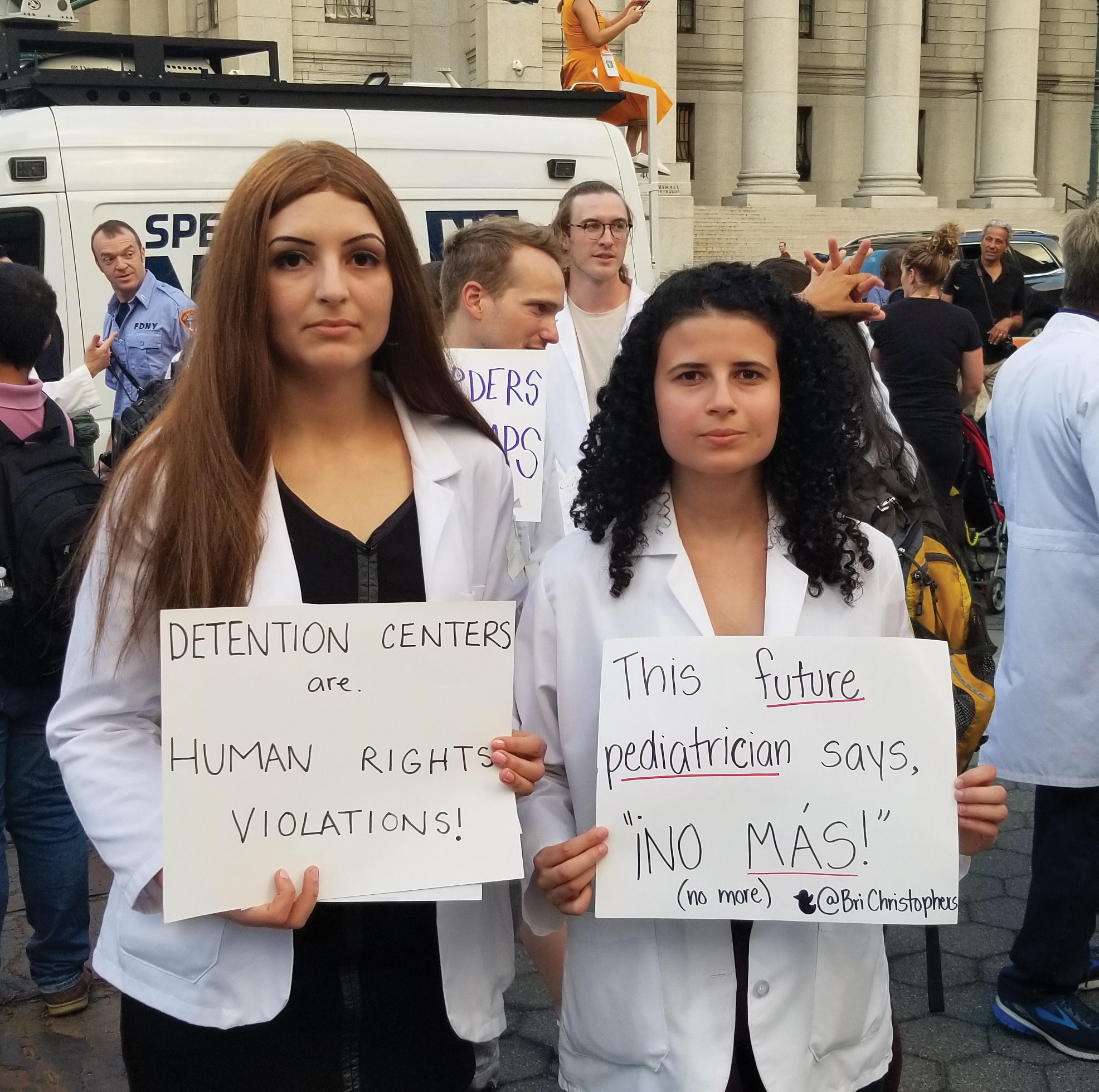
TAKING ACTION: M.D.-Ph.D. students Stephanie Azzopardi (left) and Briana Christophers at a protest, held in Manhattan’s Foley Square in summer 2019, against the detention of migrant children.
For many future doctors, the importance of embracing such activism is self-evident. A recently published study of medical students across the country found that nearly nine out of ten consider civic engagement to be an integral part of their professional duties. Dr. Dana Zappetti, assistant professor of medicine and former associate dean for student affairs at Weill Cornell Medicine, says one reason for this might be that since incoming medical classes are more diverse, students have a broader range of backgrounds that help shape their worldview. She also points out that today’s future doctors have grown up with the Internet, which has allowed them to be more informed about a wider range of current events at a younger age than previous generations. Plus, it’s far easier these days to connect online and organize for change. “When I was in medical school, if somebody wanted to have a meeting about something, they would hang a flier on a bulletin board — and if I happened to walk past and see it, maybe I’d show up,” says Dr. Zappetti. “Now we use e-mail and social media sites to bring people together.”
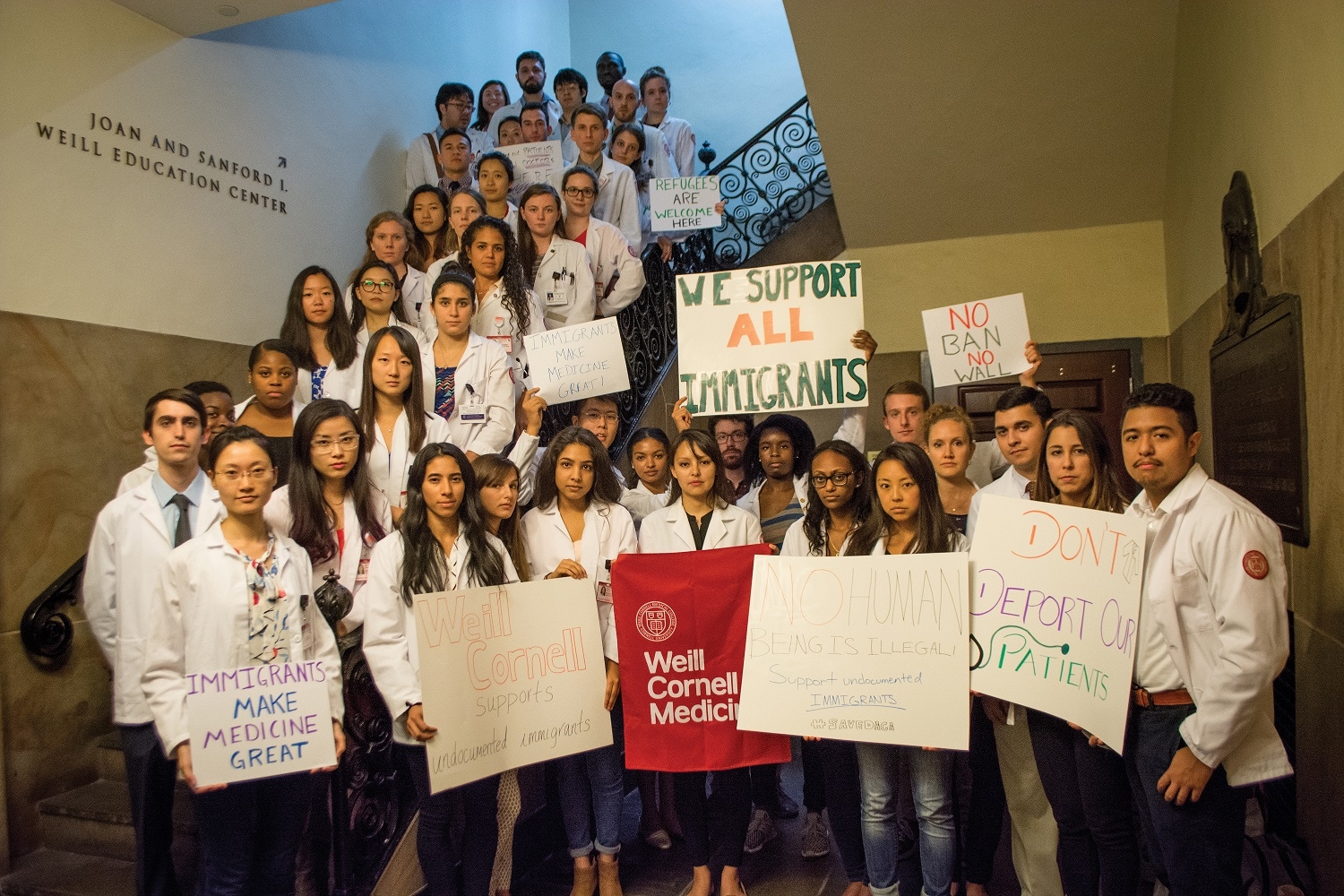
TAKING A STAND: In fall 2017, WCM student activists gathered for a group photo in support of immigrants and refugees; participants included Nneoma Adaku (at center right, holding a sign over her head), co-founder of White Coats for Black Lives.
In recent years, more medical schools have started to incorporate advocacy into training, either by integrating learning opportunities into required courses and electives or by supporting activities outside the classroom that are often launched by students themselves. William Ford ’22 says he was happy to see an activist bent in some of the assignments for his second-year medicine clerkship; one directed him and his classmates to tweet about a social justice issue that they perceived as affecting patients. Ford also helped organize the second annual Advocacy in Medicine conference last fall; co-funded by Weill Cornell Medicine and held at the New York Academy of Medicine, it was attended by more than 200 healthcare advocates and medical students from Weill Cornell Medicine and other institutions throughout New York City, who spent a day listening to keynote speakers and participating in hands-on workshops. Among the topics discussed were disability justice and rights, the impact of climate change on health, and the challenges immigrants encounter when trying to access healthcare. “For a very long time there’s been this idea that medicine should only be about treating the patient in front of you,” says Ford, who’s also a board member of the Weill Cornell Medicine chapter of Students for a National Health Program, which advocates for a single-payer (or “Medicare for All”) system. “What the conference aims to do is to say not only should you care about these things, but here are avenues for you to act on these problems that your patients face in a way that’s bigger than your individual practice as a physician.”
Second-year M.D.-Ph.D. student Briana Christophers also helped coordinate the conference. As an undergrad at Princeton, she spent a lot of time advocating on behalf of students of color and wanted to continue that work in medical school and beyond. One key aspect of the conference, she says, is that it teaches young people tangible skills that makes their advocacy endeavors more impactful, such as how to best facilitate meetings with elected officials or use social media to influence public policy. Those were critical skills when Christophers joined Weill Cornell Medicine’s Latino Medical Students Association last fall in a nationwide call to action to encourage lawmakers to support a bill that would ensure that migrants detained at the border have access to clean water, food, shelter, proper sanitation and basic health screenings. Holding signs with the hashtag #WhiteCoatsForHumanRights, Christophers and others gathered for a photo and posted it to Twitter and Instagram along with a script individuals could use when contacting their representative about the bill. It was an important issue for Christophers, who had spent three weeks in summer 2019 volunteering at a resource center in El Paso, Texas, for migrants who had just been released from detention. “There was a pregnant woman whom we had to send to the hospital because she was severely dehydrated and malnourished; one woman was having a panic attack because she hadn’t had her anxiety medication for a week,” she says. “As a future physician who wants everyone to have the best possible foundation from which to live healthfully, I was outraged that migrants seeking help were in these conditions.”
Fourth-year M.D.-Ph.D. student Nneoma Adaku is another Weill Cornell Medicine trainee who has firmly stepped into an activist role. She co-created the inaugural advocacy conference in 2018, after realizing that there were many other students who, like her, wanted to learn how to build more effective advocacy strategies. That came on the heels of another effort: within months of arriving at Weill Cornell, Adaku co-founded a chapter of White Coats For Black Lives, a national medical-student-run organization that strives to eliminate racial bias in healthcare and promote the wellbeing of people of color. So far the chapter has hosted a town hall to discuss racism in medicine and launched social media campaigns to protest the federal government’s ban on travelers from predominantly Muslim countries and the repeal of the Deferred Action for Childhood Arrivals (DACA) program, an Obama-era action that protects certain young undocumented immigrants who came to the United States as children from deportation. “It’s impossible to separate social issues and the biology behind a disease or health problem,” says Adaku. “There’s a crisis of Black maternal mortality because racism exists in our society, and it manifests in childbirth outcomes. If your patient is undocumented and ICE is trying to deport them, how does that affect their health? I think more and more people in medicine are recognizing how important it is to talk about how these things intersect.”
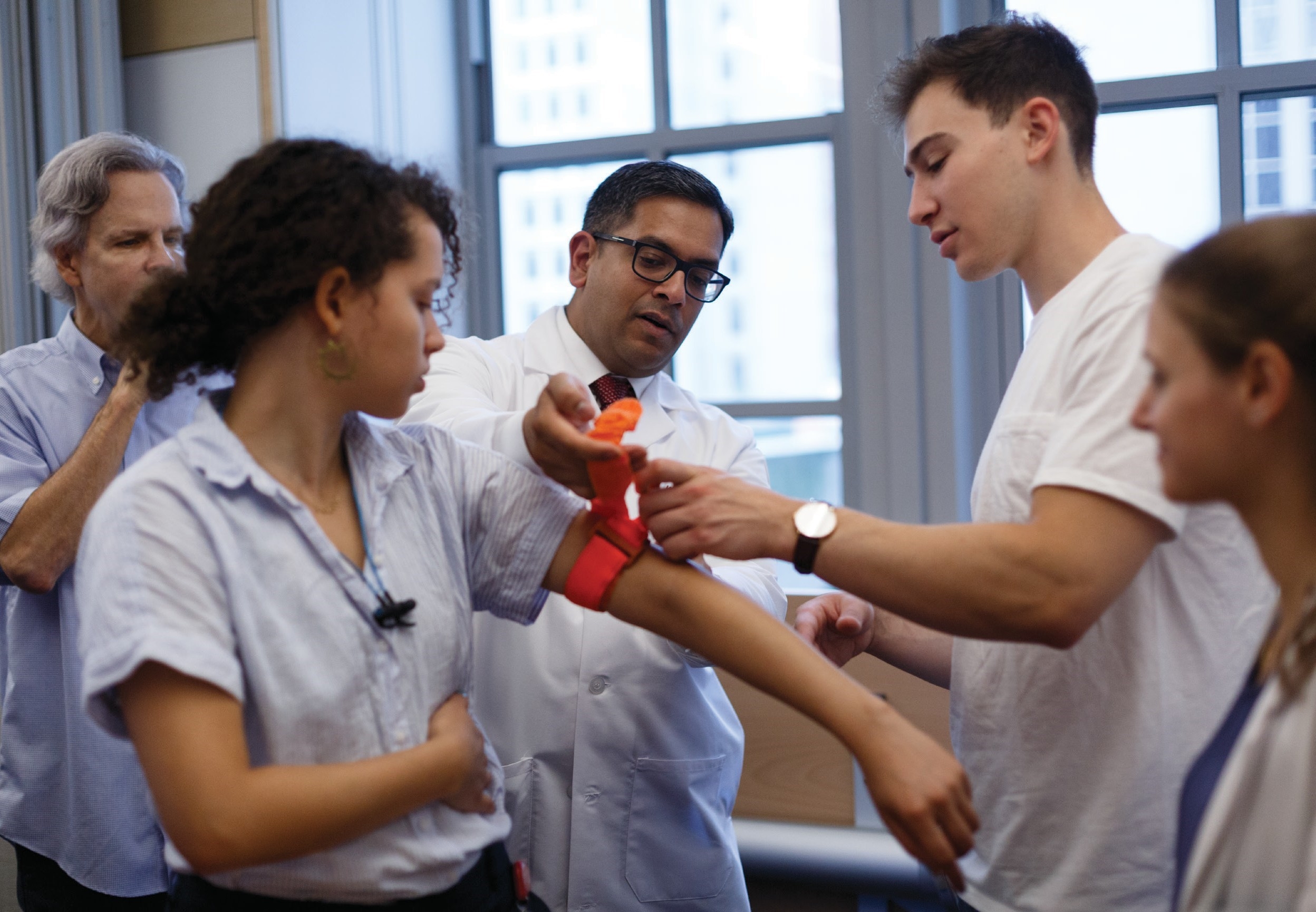
Surgery professor Dr. Mayur Narayan (at center), leading a Stop the Bleed event on campus at the start of the fall 2018 semester. Credit: Ashley Jones
This story first appeared in Weill Cornell Medicine, Summer 2020

